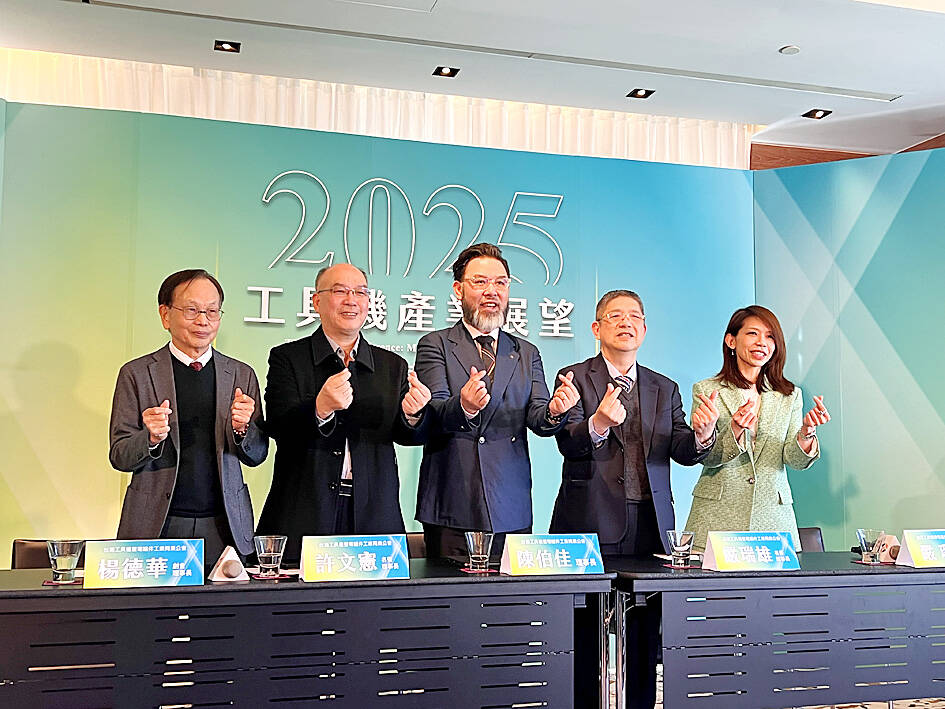Machine tool exports are expected to grow 5 to 10 percent this year, as the market gradually stabilized in the final quarter of last year and prospects became clearer, the Taiwan Machine Tool and Accessory Builders’ Association (TMBA, 台灣工具機暨零組件公會) said yesterday.
However, sentiment among its member companies is mixed, as many of them — especially components manufacturers — expect revenue to grow this year, but are cautious about the outlook for exports, the association said.
An internal survey by the association found that 50 percent of its members expect outbound shipments to grow this year, 27 percent project a decline and 23 percent forecast a flat performance, it added.

Photo: Lin Jin-hua, Taipei Times
“This indicates the industry is still facing challenges from the external environment,” association chairman Patrick Chen (陳伯佳) told a news conference in Taipei.
Challenges mainly stem from the trade policy of the incoming administration of US president-elect Donald Trump, which could reshape global economic order and accelerate the relocation and realignment of supply chains, Chen said.
Moreover, as Trump vowed during his presidential campaign that he would impose new tariffs on imported goods, Taiwan must pay close attention to this matter, as its trade surplus with the US remains high, which could become a factor in future trade negotiations, he said.
Meanwhile, countries’ imposition of carbon reduction measures and a declining birthrate worldwide have prompted the industry to speed up digitalization, high-efficiency and green development, he added.
“2024 is expected to be the bottom and we hope there would be a chance to turn things around in 2025,” he said.
Taiwan’s machine tool exports last year declined 14.8 percent year-on-year to US$2.22 billion, while shipments of machine tool components grew 1.2 percent to US$1.51 billion, association data showed.
By products, metal-cutting machine tool exports fell 16.8 to US$1.83 billion, machine centers slumped 24.5 percent to US$658.21 million, lathes dropped 18.1 percent to US$533.63 million and metal-forming machinery slid 3.7 percent to US$383.42 million, the data showed.
Outbound shipments to China, including Hong Kong — the nation’s main export market — fell 11.5 percent year-on-year to US$630.59 million, and those to the US, the second-largest market, dropped 9.7 percent to US$341.31 million, the data showed.
Shipments to Turkey, the third-largest, plummeted 33.6 percent to US$192.29 million, while those to India, the fourth-largest, rose 20.8 percent to US$145.87 million, the data showed.
Ranking from fifth to 10th were Vietnam, Thailand, Germany, the Netherlands, Japan and South Korea, with mixed performances in shipments, the data showed.
The association has high hopes for the Taiwan International Machine Tool Show, which is to take place at Taipei Nangang Exhibition Center from March 3 to 7.
The trade fair is to showcase the local industry’s achievements in digital transformation and sustainable development, and is expected to help domestic manufacturers secure orders and bolster their presence in the global market, it said.

NEW IDENTITY: Known for its software, India has expanded into hardware, with its semiconductor industry growing from US$38bn in 2023 to US$45bn to US$50bn India on Saturday inaugurated its first semiconductor assembly and test facility, a milestone in the government’s push to reduce dependence on foreign chipmakers and stake a claim in a sector dominated by China. Indian Prime Minister Narendra Modi opened US firm Micron Technology Inc’s semiconductor assembly, test and packaging unit in his home state of Gujarat, hailing the “dawn of a new era” for India’s technology ambitions. “When young Indians look back in the future, they will see this decade as the turning point in our tech future,” Modi told the event, which was broadcast on his YouTube channel. The plant would convert

‘SEISMIC SHIFT’: The researcher forecast there would be about 1.1 billion mobile shipments this year, down from 1.26 billion the prior year and erasing years of gains The global smartphone market is expected to contract 12.9 percent this year due to the unprecedented memorychip shortage, marking “a crisis like no other,” researcher International Data Corp (IDC) said. The new forecast, a dramatic revision down from earlier estimates, gives the latest accounting of the ongoing memory crunch that is affecting every corner of the electronics industry. The demand for advanced memory to power artificial intelligence (AI) tasks has drained global supply until well into next year and jeopardizes the business model of many smartphone makers. IDC forecast about 1.1 billion mobile shipments this year, down from 1.26 billion the prior

People stand in a Pokemon store in Tokyo on Thursday. One of the world highest-grossing franchises is celebrated its 30th anniversary yesterday.

Zimbabwe’s ban on raw lithium exports is forcing Chinese miners to rethink their strategy, speeding up plans to process the metal locally instead of shipping it to China’s vast rechargeable battery industry. The country is Africa’s largest lithium producer and has one of the world’s largest reserves, according to the US Geological Survey (USGS). Zimbabwe already banned the export of lithium ore in 2022 and last year announced it would halt exports of lithium concentrates from January next year. However, on Wednesday it imposed the ban with immediate effect, leaving unclear what the lithium mining sector would do in the